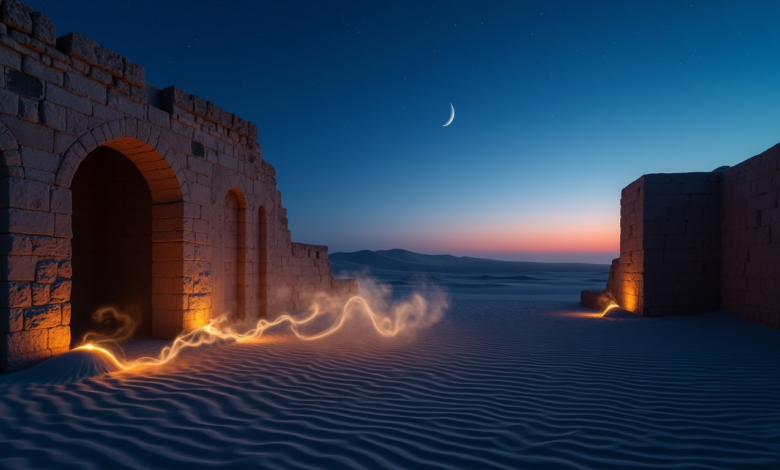
The Night of Jinn: What Ancient Islamic Texts Really Tell Us
A 2012 Pew Research Center survey reveals that belief in jinn remains incredibly strong throughout the Muslim world. The numbers tell a compelling story: 86% of Moroccans, 84% of Bangladeshis, and 77% of Pakistanis believe these beings exist. The Quran mentions these supernatural beings 29 times and describes their creation from smokeless fire, unlike humans who came from clay.
Jinn play an important role in Islamic theology, though people often misunderstand their nature and activities. The Quran describes them as free-willed beings who must answer for their actions, just like humans. These mysterious creatures can transform into different forms and live in their own societies with distinct communities and hierarchies. This piece looks at authentic Islamic teachings about jinn and helps separate age-old facts from cultural myths that developed over time.
The Origin of Jinn in Islamic Theology
The mysterious jinn hold a unique place in Islamic theology as beings that existed well before humans. Their story tells us a lot about their role in Islamic cosmology and why they continue to fascinate believers and scholars alike.
Etymology of the word ‘jinn’
“Jinn” comes from the Arabic root “ja-na-na” (جَنّ / جُنّ, jann), which means “to hide” or “to conceal”. This origin perfectly matches their basic nature—creatures that stay hidden from human sight in a parallel dimension called al-Ghaib, the unseen realm.
Jinn serves as an Arabic collective noun, as with “humanity” for all humans. You’ll find jinni (masculine) and jinniyah (feminine) as singular forms. Western literature and pop culture later changed this into the term we know as “genie”.
Some experts suggest a link between the Arabic jinn and Latin genius (guardian spirits in Roman religion). They point to possible mixing during the Roman Empire under Tiberius and Augustus. Many academics still debate this connection. Another view links jinn’s name to Jannah (heaven), suggesting they’re closer to the heavens than Earth.
Creation of jinn from smokeless fire
The Quran clearly explains jinn’s origins in several verses. Surah Ar-Rahman states: “And He created the jinn from a smokeless flame of fire” (55:15). This unique origin makes jinn different from humans (made from clay) and angels (created from light).
The Quran uses mārijin min nār for “smokeless fire,” which experts interpret differently. Some define it as a “mixture of fire” or a “flame mixed with the black substance of fire”. Ibn Abbas, Prophet Muhammad’s cousin and companion, described it as the “tongue of the fire which is on the tip of the flame when it flares up”.
Surah Al-Hijr (15:27) uses samūm, meaning “scorching” or “blazing fire”. This led scholars like Ibn ‘Arabi to hypothesize that jinn formed from fire and air elements, which explains why they’re ethereal and quick to move.
Jinn’s creation happened before humanity. Many Islamic traditions say jinn were among Allah’s first creatures. The Quran confirms: “And the jinn, We created before from scorching fire” (15:26-27).
Jinn in pre-Islamic Arabian beliefs
Arabs deeply believed in jinn long before Islam. Pre-Islamic Arabs not only accepted their existence but often worshiped them as deities. Julius Wellhausen, a prominent Semitic culture scholar, noted that people believed jinn “lived in or haunted desolate, dark and dingy desert places”.
Early beliefs connected jinn to supernatural influences. Pre-Islamic Arabs linked various phenomena to these invisible beings:
- Medical conditions: People blamed jinn for diseases and mental illnesses
- Inspiration: Many thought jinn gave direct insights to soothsayers, philosophers, and poets
- Social structure: Jinn’s society mirrored pre-Islamic Arabian culture with its own tribes and groups
Pre-Islamic times already recognized good and bad jinn. Julius Wellhausen points out that while many feared jinn as evil entities, pre-Islamic Arabs also knew about friendly and helpful ones. Northern regions like Palmyra and Baalbek sometimes used jinni and ilah (deity) interchangeably, showing little difference between jinn and divine beings.
The sort of thing I love comes from this period’s legends describing jinn as Earth’s first inhabitants. A Persian Islamic legend tells how a jinn king named Jann ibn Jann ruled the world for two thousand years before Adam existed. These ancient jinn had their own prophets, just like humans would later, but ended up corrupt. The story goes that when Jann ibn Jann defied divine authority, God sent angels led by Al-Harith (later called Iblis) to defeat him.
These early jinn beliefs became the foundations for Islamic theology’s more structured understanding of these mysterious beings.
What is a Jinn According to the Quran
“Say: It has been revealed to me that a company of jinn listened (to my recitation). They said, ‘We have really heard a wonderful Quran’. It shows the path of guidance. So we have believed in it and will never set up any partner with our Lord (Allah Almighty). And Exalted is the Glory of our Lord: He has taken neither a wife nor any children.” — Prophet Muhammad, Final messenger of Islam
The Quran gives a complete picture of jinn as Allah’s distinct creation, different from humans and angels. These mysterious beings appear throughout the Islamic holy book. The text helps believers understand their nature, abilities, and how they relate to humanity.
Key verses mentioning jinn
The Quran talks about jinn in many passages that establish their basic characteristics. Allah states in Surah Al-Hijr: “And the jinn, We created before from scorching fire” (15:26-27). This creation from fire sets them apart from humans (created from clay) and angels (created from light).
Surah Al-A’raf makes it clear that jinn can see humans while staying invisible: “He and his tribe see you from where you cannot see them” (7:27). This one-way visibility adds to the mysterious nature of how jinn interact with humans.
The Quran clearly rejects any idea that jinn have divine knowledge or powers. Many verses challenge pre-Islamic beliefs about jinn’s omniscience. Surah Al-Jinn states: “They have no knowledge of the future” (72:10). So, jinn can’t foresee events or know the unseen.
The text also tells us the main goal for both humans and jinn in Surah Al-Dhariyat: “And I did not create the jinn and mankind except to worship Me” (51:56). This verse shows both creations share the same spiritual duty, despite their different natures.
Surah Al-Jinn (Chapter 72)
Surah Al-Jinn (Chapter 72) gives us the best look at these beings. The chapter starts with a remarkable story of jinn listening to Prophet Muhammad’s Quran recitation: “Say, ‘It has been revealed to me that a group of jinn listened [to the Quran], and said: ‘Indeed, we have heard a wondrous recitation'” (72:1).
The surah tells us how these jinn felt deeply moved by the Quran’s message and quickly saw its divine source. They said: “It guides to the Right Way; so we have come to believe in it, and we will not associate aught with Our Lord in His Divinity” (72:2).
This chapter shows us several things about jinn:
- They live in communities with different beliefs and religions
- They can understand human language and the Quran
- They can choose faith and make moral decisions
- They know it’s wrong to associate partners with Allah
The jinn admit in this surah that “some of us are upright and some of us are otherwise for we follow widely divergent paths” (72:11). This confirms they have various belief systems among themselves.
Jinn as accountable beings with free will
The Quran’s most profound teaching about jinn shows they have free will and moral accountability, just like humans. The text states: “The jinn, like mankind, are a creation possessed of power and authority, and they, just like them, can choose between obedience and disobedience, faith and disbelief”.
Their freedom to choose means they face divine judgment too. Surah Al-Rahman declares: “But for him who fears the standing before his Lord, there will be two gardens (in Paradise)” (55:46-47). This addresses both humans and jinn. The Quran also warns: “I will fill Hell with jinn and mankind together” (32:13).
Allah sent messengers to guide jinn: “O company of jinn and mankind, did there not come to you messengers from among you, reciting to you My verses and warning you of the meeting of this Day?” (6:130). This shows Allah’s guidance reached jinn just as it did humans.
The Quran shows jinn not as purely evil or good, but as complex beings who must choose their path. Surah Al-Jinn states: “Among us some are Muslims (Those who have submitted to Allah), and some of us are deviant. So those who became Muslims found the Right Course; but those who deviated from the Truth, will be the fuel for Hell” (72:14-15).
Types and Categories of Jinn in Islam
Islamic theology classifies jinn into several distinct groups based on their beliefs, loyalties, and physical forms. These classifications help Muslims understand and interact with the unseen world around them.
Muslim vs. non-Muslim jinn
Jinn have free will just like humans and can choose their spiritual path. The Quran clearly states that jinn follow different religious beliefs: “And of us some are Muslims (who have submitted to Allah), and of us some are Al-Qasitun (disbelievers those who have deviated from the Right Path)”. This split reflects the same religious diversity we see in humans.
Islamic literature refers to Muslim jinn as “muslimū l-jinn” – those who follow Islam’s message. These believing jinn fulfill their purpose as stated in the Quran: “And I did not create the jinn and mankind except to worship Me.”
Non-Muslim jinn take a different path and reject divine guidance. They follow various faiths and beliefs. One source explains it simply: “They are like humans in having different religions, sects, and ideologies. There are Muslims, Christians, and Jews and the rest of the crowd!”.
Islamic scholars view both jinn and humans as “mukallāf” – beings who must answer to Allah for their actions. Both creations must follow divine law (sharīʿa) and perform religious duties.
Iblis (Satan) and his followers
Iblis leads the non-Muslim jinn and serves as the commander of devils (shayāṭīn) in Islamic tradition. His story begins when he refused Allah’s command to bow before Adam. The Quran tells us: “So the angels prostrated themselves, all of them together. Except Iblis (Satan) — he refused to be among the prostrators”.
Pride drove Iblis’s defiance: “I am better than him. You created me from fire and created him from clay”. Allah punished this arrogance by expelling him from heaven and cursing him until the Day of Judgment.
Iblis then asked Allah for time until the Day of Resurrection to lead humanity astray. Allah granted this request. Iblis proclaimed: “O my Lord! Because You misled me, I shall indeed adorn the path of error for them (mankind) on the earth, and I shall mislead them all”.
Scholars debate Iblis’s true nature – whether he started as an angel or a jinn. The renowned scholar Ibn Kathir stated: “Iblis was not one of the angels, not even for a single moment. He is the father of the jinn, just as Adam is the father of mankind”.
Shayateen (devils) follow Iblis’s lead. They work to misguide humanity through various methods. Traditions say each person has “an assigned demon from the Jinns” who tempts them toward sin. Some accounts mention Iblis’s five sons, each specializing in different types of temptation.
Different forms jinn can take
Jinn naturally stay invisible to humans but can change their shape. Islamic tradition describes several physical forms they might take:
- Winged creatures: Some jinn “have wings, and they fly through the air”
- Animal forms: Many jinn appear as “snakes and dogs”, with snakes being their common choice
- Other creatures: Jinn often show up as “scorpions and lizards” and similar ground-dwelling animals
A hadith explains: “The jinn are of three types: a type that has wings, and they fly through the air; a type that looks like snakes and dogs; and a type that stops for a rest then resumes its journey”.
Jinn have physical bodies (ajsām) despite their shapeshifting powers. Sometimes, dead jinn leave behind “a carcass similar to either a serpent or a scorpion”, showing they have real physical forms.
Jinn’s ability to transform makes them powerful opponents. They can watch humans while staying invisible unless they choose otherwise. Yet Islamic teachings remind us that Allah limits jinn’s powers, and faith and divine protection can overcome them.
The Reality of Jinn Powers and Limitations
Jinn have extraordinary abilities that make them different from humans. These powers come with clear limits set by their Creator. A balanced point of view comes from knowing their capabilities and limitations.
Knowing how to see humans while staying invisible
Jinn’s most basic trait is their one-sided visibility. The Quran states this clearly: “Verily, he [the devil] and Qabeeluhu (his soldiers from the jinns or his tribe) see you from where you cannot see them”. This creates an uneven dynamic between humans and jinn.
Ibn Hazm, a prominent Islamic scholar, made this clear: “The jinn are real, and they are part of the creation of Allah, may He be Glorified and Exalted. There are disbelievers and believers among them; they can see us but we cannot see them”.
This doesn’t mean humans can never see jinn. They stay hidden from human sight under normal conditions. One scholar describes them as “conscious beings with free will that are hidden from human perception”.
Jinn’s power to watch humans without being seen gives them big advantages. They can learn about human activities, habits, and weak points.
Shapeshifting capabilities
Jinn can change their shape remarkably well. Islamic tradition tells us they can take many forms at will. A hadith from Abū Thaʿlabah tells us: “The Jinn have three forms: one form like dogs and snakes, one form flies through the air, and one form comes and goes”.
They can transform into:
- Animal forms: They often appear as “snakes, scorpions and so on”
- Domestic animals: They take shapes of “camels, cattle, sheep, horses, mules and donkeys”
- Avian forms: They appear as various birds
- Human appearances: They can look human, but “when they shift into a human form however, they are said to stay in part animal and are not fully human”
Jinn’s bodies are made of what’s described as “thin and subtle bodies” (Arabic: أَجْسَام, ajsām). This lets them “disperse the components of their bodies and then collate them. When they collate their bodily components, they can be seen. And when they disperse themselves, they become invisible like water vapor”.
Limitations set by Allah
Despite these amazing powers, jinn must follow strict divine rules. Islamic theology emphasizes that “despite some superhuman powers, the jinn occupy no fundamentally different position in the Quran than humans”.
Allah limits their influence over humans. Satan and his followers “have power to incite man with tempting thoughts, to call him toward evil, and to make evil seem beautiful to him. He has no power to force anyone to do anything”. The Qur’an and ahadith show that “Satan and his cohorts only have influence over people who have surrendered their devotion to Allah”.
Scholars point out that “despite their powers, jinn operate within limitations set by Allah and can be defeated through faith and divine protection”. Some scholars say that “the jinn cannot physically possess human beings, the worst they can do is to plant thoughts in the mind, leaving it up to the individual to accept or reject”.
Jinn’s intelligence falls short of humans. Sources say: “An adult Jinn is like a Human baby when it comes to intelligence”. This explains why they haven’t built civilizations better than humans, despite their physical advantages.
Above all, “all that exists—whether they be angels, jinn, or human beings, and whether they are material or immaterial—are creations of Allah, and can only act according to Allah’s will”.
Jinn Possession: Islamic Perspective vs. Cultural Myths
Muslim communities worldwide hold strong beliefs about jinn possession that many people misunderstand. Recent studies show 40.3% of Saudi Arabia’s teachers and 50.4% of students link possession to epilepsy, even among educated populations. These deep-rooted beliefs deserve examination through both theological and medical perspectives.
Quranic and Hadith evidence on possession
Islamic scholars’ opinions vary substantially about jinn possession’s reality. Most Muslim scholars accept that jinn can physically possess people. The Quranic verse 2:275 serves as their main evidence: “Those who consume usury will rise up like someone tormented/driven insane by the devil’s touch”.
This view doesn’t have universal acceptance. Some scholars believe jinn can only whisper to humans without physical possession. They say the “devil’s touch” in Quranic references points to waswasah (whispers) that lead to disobedience, misguidance, or prey on vulnerable emotions.
Ibn Taymiyyah, a respected scholar, claimed Sunni scholars reached consensus (ijma) about possession’s reality. Critics note that historical agreement focused on jinn’s ability to enter the body near the heart/brain—not their power to take control of human autonomy.
Exaggerated cultural beliefs
Many cultural interpretations go beyond authentic Islamic teachings. Muslim communities often attribute unexplained behavior to jinn possession. This belief remains strong among educated people in Middle Eastern countries and British Muslim communities.
Possession states show cultural variations. Swahili culture uses jinn possession as a healing method. Some regions report voluntary possession that supposedly grants powers of divination.
Exorcism practices range from acceptable to concerning. Traditional Islamic ruqyah seeks Allah’s protection through Quranic recitation. Some faith healers strike possessed individuals and claim jinn feel the pain—a practice Muslim scholars condemn as un-Islamic.
Medical conditions mistaken for possession
Medical science identifies several conditions that people wrongly attribute to supernatural causes:
- Epilepsy and seizures
- Sleep paralysis (48% of Egyptian sufferers call it “jinn attack”)
- Mental disorders like schizophrenia and dissociative disorders
- Compulsive behaviors and memory issues
The ICD-10 lists possession states under dissociative (conversion) disorders—conditions that temporarily remove personal identity and full awareness. These states become pathological when they occur involuntarily outside culturally accepted contexts.
Healthcare professionals stress that apparent possession often masks identifiable medical conditions. Doctors must balance proper treatment with cultural awareness. Research shows that “When medicine invites conflict with culture and religion, the therapeutic alliance suffers”. Treatment outcomes improve when religious leaders work with medical professionals.
Historical Accounts of Jinn in Islamic Tradition
Islamic history holds some of its most remarkable chapters in the documented encounters between jinn and humans. The relationship between visible and invisible worlds comes alive through accounts of Prophet Muhammad’s (PBUH) interactions with jinn.
Interactions with Prophet Muhammad (PBUH)
The most significant encounter took place in the 11th year of prophethood at Nakhla, a location between Makkah and Taif. Seven to nine jinn stopped to listen as the Prophet prayed and recited Quran during the night. The words they heard fascinated them so much that they accepted Islam. They declared: “We have heard a most amazing Recitation. It guides to right guidance so we believe in it and will not associate anyone with our Lord”.
Surah Al-Jinn (Chapter 72) emerged from this event and documents their response. These jinn went back to their communities as missionaries, and their efforts ended up bringing thousands of jinn to Islam. Stories tell that around 12,000 jinn came to visit the Prophet because of their preaching.
The Quran reveals that jinn would gather around the Prophet during his religious obligations: “When the servant of Allah stands calling on Him, they almost swarm all over him”. This shows his role as a prophet sent to both mankind and jinn.
Stories from the companions
Ibn Mas’ud shares one of the most vivid accounts of jinn interaction. He went with the Prophet to Hujun, where the Prophet drew a protective line and told him: “Do not cross this line”. Ibn Mas’ud watched as jinn came down “like locusts” while the Prophet recited the Quran loudly.
The companions once noticed the Prophet’s long absence when he went to answer nature’s call. He later explained: “I was called by a group of Jinns over that mountain, who had embraced Islam and wanted to learn the religion from me. It took me the whole night to teach them”. The companions called this night “Laylatul Jinn” (The Night of Jinn).
Notable historical incidents
Some jinn became known as “Muslim jinn” (muslimū l-jinn) after these encounters. Islamic scholars like Ibn Hazm confirmed that “among the jinn were some who accompanied the Messenger of Allah and believed in him”.
Islamic scholars debated whether these believing jinn should be called “Sahabah” (companions). Ibn Hajar stated: “As for the jinn, the more correct view is that they are included in this definition, because the Prophet was definitely sent to them, and they are accountable”.
The Prophet and jinn shared knowledge during their meetings. The companions found burnt sticks and ash that indicated food had been cooked when they left one such gathering. On top of that, these meetings helped establish practical guidance. The Prophet prohibited using bones and animal dung for cleaning after using the bathroom, as jinn used these items for food.
Night Activities of Jinn: Separating Fact from Fiction
The Islamic world comes alive with heightened jinn awareness as night falls. Both authentic teachings and cultural myths have shaped how Muslims deal with darkness through the ages.
Authentic hadiths about nighttime and jinn
Several verified hadiths link nighttime to increased jinn presence. Prophet Muhammad (PBUH) gave a clear warning: “When the wings of the night spread – or when evening comes – keep your children in, for the devils come out at that time”. He also gave Muslims specific guidance to:
- Close doors while mentioning Allah’s name
- Cover vessels (even partially)
- Tie waterskins after saying bismillah
- Extinguish lamps before sleeping
These protective steps become crucial as darkness sets in since “the devils come out when the sun sets, until the first part of the night is over”. Muslim parents still follow these prophetic teachings by calling their children inside at maghrib (sunset) prayer time.
Cultural superstitions about specific nights
Many cultural beliefs about jinn go beyond authentic Islamic teachings. Pakistani families avoid bathing after sunset or using perfume at night because they believe it attracts jinn. People also stay away from sitting under trees after dark since “jinns tend to reside in trees”.
Common beliefs include staying away from empty or deserted places at night. People also recite specific prayers before entering unfamiliar spaces. These practices show amazing variety by region yet remain common throughout the Muslim world.
Why darkness is associated with jinn activity
Darkness helps jinn movement because it’s “more conducive to devil forces coming together than any other time”. Islamic scholars tell us that night gives jinn more freedom to “spread out” as they can “move about at night better than during the day”.
This connection comes from jinn’s basic nature – creatures made from smokeless fire who live in a realm different from humans. The darkness acts as a connection between their world and ours since they exist in a parallel dimension.
Islamic Protection Against Harmful Jinn
Islam provides practical tools to protect against potential harm, beyond its faith-based teachings about jinn. Believers find comfort through sacred texts and rituals that serve as divine safeguards against supernatural influences.
Quranic verses for protection
The Quran acts as the main shield against harmful jinn. Ayat al-Kursi (Quran 2:255) stands as one of the most powerful protective verses. Prophet Muhammad said that anyone who recites it “will continue to have protection from Allah, and no shaytan will come near him until morning”.
Al-Mu’awwidhatayn, the final two chapters of the Quran—Surah Al-Falaq (113) and Surah An-Nas (114)—are a great way to get protection from evil forces and supernatural harm. Scholars often recommend reading these chapters before sleep.
The last verses of Surah Al-Baqarah (2:285-286) give complete protection, especially when you have to sleep or stay at home.
Prophetic supplications (dua)
Specific supplications from Prophet Muhammad provide remarkable protection among other Quranic recitations. Muslims should recite this before entering potentially dangerous spaces:
“O Allah, Originator of the heavens and earth, Knower of the Unseen and Visible, there is no true god but You, Lord of all things and their Sovereign. I seek refuge in You from the evil of myself and the evil of Shayṭān”.
Daily protection comes from reciting:
“In the Name of Allah, with Whose Name nothing is harmed on earth nor in heaven, and He is the All-Hearing, the All-Knowing” three times.
Strengthening faith as ultimate protection
Strong faith serves as the best defense, beyond specific recitations. Ibn al-Qayyim highlighted that “Duʿāʾ is one of the most beneficial remedies. It is the enemy of calamity; it repels it, cures it, prevents its occurrence”.
“The Muslim must, above all else, arm himself with the weapon of faith and righteous deeds”. Regular remembrance of Allah (dhikr) creates an impenetrable barrier because “no one can find any better protection against the Shaytan than the remembrance of Allah”.
Avoiding places jinn frequent
Some locations need careful approach due to jinn presence. These include bathrooms, isolated areas, and places of impurity. Scholars advise keeping one’s house free of everything that involves disobedience toward Allah. They emphasize that “if there are no angels in the house, it will become a dwelling for the devils”.
Quran recitation, particularly Surah al-Baqarah, makes homes into sanctuaries that ward off negative entities.
A clear difference exists between authentic Islamic teachings and cultural misconceptions about jinn. These supernatural beings have remarkable abilities, but Allah has set clear boundaries for their interaction with humans. Muslims should focus on deepening their commitment to faith through Quranic recitation and prophetic supplications instead of living in constant fear.
Heavenly wisdom governs the complex relationship between humans and jinn. Allah created these beings from smokeless fire, and they share Earth with humanity while existing in a parallel dimension. Their presence becomes more noticeable at night, which makes following prophetic guidance essential without falling into superstition.
Strong faith and regular remembrance of Allah provide the best protection against harmful jinn. Prayer and Quranic recitation help Muslims build natural defenses against supernatural harm. The most effective strategy combines authentic Islamic practices with a balanced understanding of jinn’s true nature and limitations.






